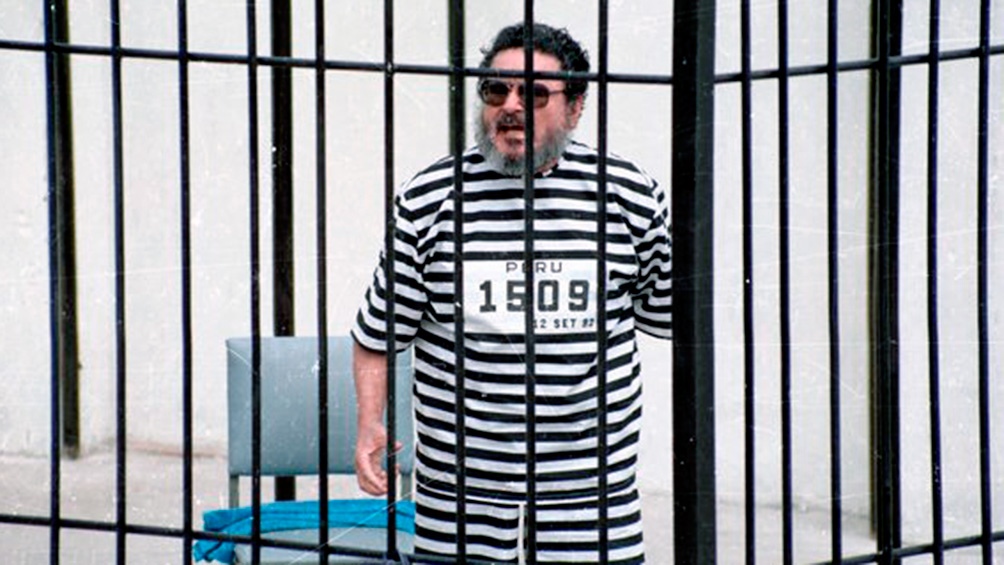He compared Soviet imperialism to US imperialism and criticized it: Who is Abimael Guzmán?
His followers declared him the Fourth Sword of Communism after Marx, Lenin and Mao. He was exhibited to the public in prisoner clothes in a cage by the Peruvian government.

Lawyer, philosophy professor, and Leader of the Shining Path Revolutionary Movement of Peru Abimael Guzmán (Manuel Rubén Abimael Guzmán Reynoso) was born on December 3, 1934.
He studied philosophy and law at the National University of San Agustín.
He was introduced to Marxism during his student years, and in 1962 he served as a lecturer in the philosophy department of San Cristóbal Huamanga University.
He visited the People's Republic of China in 1965. He compared Soviet imperialism to US imperialism and criticized it. He was arrested twice in anti-government demonstrations in the 1970s, then resigned from his job at the university and joined underground organizations, gathering around him a group of like-minded young academics committed to creating a revolution.
Manuel Rubén Abimael Guzmán Reynoso (3 December 1934 − 11 September 2021), also known by his nom de guerre Chairman Gonzalo (Spanish: Presidente Gonzalo), was a Peruvian Maoist guerrilla leader and convicted terrorist. He founded the organization Communist Party of Peru – Shining Path (PCP-SL) in 1969 and led a rebellion against the Peruvian government until his capture by authorities in 12 September 1992. He was subsequently sentenced to life imprisonment for terrorism and treason.
The movement, limited to academic circles in Peruvian universities, expanded over time. In Peru, he assumed leadership of the Shining Path revolutionary movement and, taking the pseudonym Gonzalo, launched a revolutionary peasant people's war on the Maoist model.
Approximately 70 thousand people lost their lives in the intense civil war. His followers declared him the Fourth Sword of Communism after Marx, Lenin, and Mao.
In 1985, Abimael Guzmán launched an armed struggle against the government in his Shining Path poster, starting on May 17, 1980. A search warrant was issued by the Peruvian government on charges of terrorism and treason, and he was captured along with other members of the organization during a raid on a ballet school by government forces on September 12, 1992. Fearing that the judges would be attacked by the guerrillas, the government deemed it appropriate to have them tried by military judges with their heads covered. In hearings that lasted three days, he was tried by military judges with his head covered and sentenced to life imprisonment, and sent to the Callao military naval base prison in Lima.
He was exhibited to the public in prisoner clothes in a cage by the Peruvian government. As a result of the amnesty law enacted by the government after his capture, six thousand of the 23,000 guerrillas laid down their weapons and surrendered. The Shining Path guerrillas, who decided to continue the armed struggle, continued on their way under the leadership of Oscar Ramirez Durand.
However, with the capture of Ramirez in 1999, the organization suffered a bigger blow. After the Peruvian Constitutional Court annulled the anti-terrorism law, Guzmán was retried in 2004, closed to the press, and was sentenced to life imprisonment again on October 13, 2006. He was imprisoned as a convict at the Callao Naval Base near Lima until his death. He collected his memories and evaluations in the book titled De puño y letra.
In the book, he explained his experiences during the guerrilla war, his defenses in court after he was captured, and his thoughts about the future. It still remains a mystery whether this manuscript book could be taken out of the prison cell, where strict security measures were applied. He died on September 11, 2021, at the age of 86, at the Callao Naval Base, where he had been in a cell where he had been left alone for many years.
His body was cremated on September 24, 2021, and his ashes were scattered into obscurity. He was remembered as the person who came closest to the revolution after Fidel Castro, who was also a lawyer. In the press release issued by the European Union of Democratic Forces to protest the Peruvian state, Guzan was criticized for not being released despite his serious illnesses and age, and said "Dr. The Murderer of Abimael Guzmán Reynoso (President Gonzalo) is the Peruvian State!” he said.
The Dancer Upstairs is a 2002 Spanish-American crime thriller film starring Javier Bardem, Juan Diego Botto, and Laura Morante, produced and directed by John Malkovich, telling the story of the capture of Abimael Guzmán.
The story is inspired by the Peruvian Maoist guerrilla organization Shining Path. Its leader is Abimael Guzmán, known by the pseudonym President Gonzalo. The film is adapted from the 1995 novel The Dancer Upstairs by Nicholas Shakespeare, who also wrote the screenplay. The film was directed by John Malkovich and starred Javier Bardem, Juan Diego Botto, and Laura Morante.
